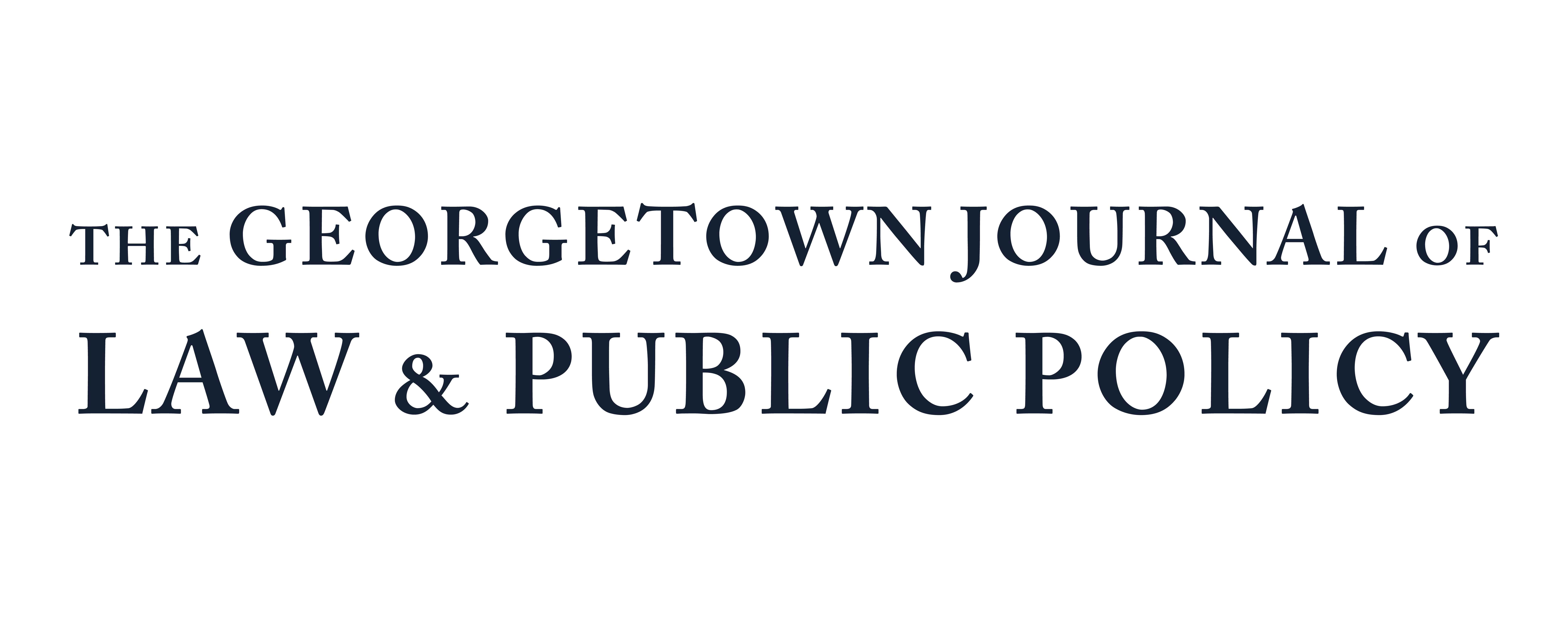Letter from the Editor
Dear Reader,
The Georgetown Journal of Law & Public Policy is proud to present the first issue of Volume Twenty. This issue contains both a selection of articles on many topics dominating the national discourse and a series of articles presented at the Georgetown Center for the Constitution’s Seventh Annual Salmon P. Chase Distinguished Lecture & Faculty Colloquium.
The Salmon P. Chase Lecture series is published in partnership with the Georgetown Center for the Constitution. The Center and its Director, Randy Barnett, remain close friends of our journal. The 2020 lecture and colloquium, published here, commemorate the 100th anniversary of the adoption of the Nineteenth Amendment, which finally extended the right to vote to women. The colloquium articles included in this volume discuss both the historical landscape surrounding the Amendment’s adoption and how Americans can ensure its potential is fully realized.
The issue begins with an introductory lecture by Professor Martha S. Jones, followed by articles from Professors Reva B. Siegel, Ellen D. Katz, Paula A. Monopoli, and David E. Bernstein. Each piece examines the fight for women’s suffrage through a unique lens, whether it be the concept of “constitutional memory” or the juxtaposition of important judicial precedents. Given the recent focus on voting laws and practices, the symposium articles provide a welcome overview of the history of the franchise in America and analysis of one of the Constitution’s most prominent guarantees of it.
In addition, the issue features scholarship from a distinguished group of authors on an array of timely topics. Josh Blackman and Seth Barrett Tillman examine the threshold issues at play in the Emoluments Clause litigation brought against President Donald Trump, providing a framework for categorizing actions by presidents and analyzing when and how such suits can be brought. The Honorable Timothy Tymkovich of the U.S. Court of Appeals for the Tenth Circuit and Hayley Stillwell put forth a theory of malicious prosecution based not in the Fourth Amendment, but rather in the Fourteenth Amendment’s protection of due process. Eric R. Claeys identifies the holdings and dicta of both Roe v. Wade and Planned Parenthood of Southeastern Pennsylvania v. Casey in response to Chief Justice Robert’s characterization of each during oral arguments in Dobbs v. Jackson Women’s Health Organization. Sherif Girgis argues against recent suggestion that the Supreme Court uphold the Mississippi statute at issue in Dobbs under Casey’s undue-burden test, finding such suggestions to be based on enduring misreadings of Casey, and that such an outcome would run counter to the case’s actual logic. Paul Larkin, Jr., offers two pieces related to the federal government’s response to COVID-19. The first considers the political, practical, and constitutional questions at play when the federal government decides between persuading and coercing Americans into receiving a vaccine. The second analyzes the constitutional questions raised by OSHA’s COVID-19 vaccination mandate.
Following the articles is a speech given by the Honorable James C. Ho of the U.S. Court of Appeals for the Fifth Circuit, in which he addresses a recent free speech controversy at Georgetown University Law Center in the context of “cancel culture” and advocates for color-blindness in the fight against racism.
Finally, we are pleased to publish three student notes in this issue, including our first from the new Tri-Journal Notes Exchange established by our journal, the New York University Journal of Law & Liberty, and the Texas Review of Law & Politics. GJLPP member Nicholas Iacono adds to the recent debate over stare decisis by examining whether Article III allows Justices to uphold erroneous precedent. Rachel Scholz-Bright responds to concerns that strict nondelegation doctrines are incompatible with the needs of the administrative state by conducting a survey of three states’ experiences with balancing both. In the issue’s final note, Joseph Capobianco proposes a novel bright-line test for the ministerial exception.
The past few years have been tumultuous ones to say the least. National discussions concerning racism, sexism, abortion, our nation’s election laws, the scope of executive power, and even the judicial doctrine of stare decisis have dominated the news and made their way into our everyday conversations. Typically lacking in the coverage of these topics, however, is the kind of in-depth and thoughtful analysis that can broaden one’s perspective and foster understanding rather than discord. Promoting this kind of scholarship is why law journals are perhaps more vital than ever, and why our journal takes such pride in providing a platform to authors from across the ideological spectrum. Consistent with the principles of free speech, freedom of thought, and equality—enshrined in both our federal constitution and in Georgetown Law’s stated commitments—our journal will continue to evaluate and publish scholarship without regard to an author’s race, gender, religion, or even partisan affiliation. The Constitution is a document for every American, and the Georgetown Journal of Law & Public Policy shall remain a platform open to all who wish to discuss it.
On behalf of the entire staff at the Georgetown Journal of Law & Public Policy, thank you for your interest in our journal. We hope you find the scholarship in this issue enlightening and a valuable addition to the legal debates at the forefront of our national discourse.
Luke Bunting
Editor-in-Chief, Volume 20
Georgetown Journal of Law & Public Policy

